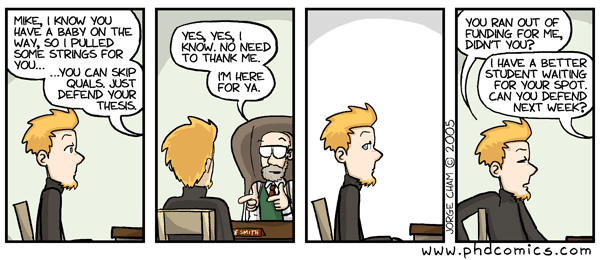I’ve received a few inquiries for advice about the PhD thesis defense, so here is a compilation of the tips and resources that I found helpful.
Advice
Here is the net of the advice I received from colleagues mixed with my own recollections:
- Only a terrible human being of an advisor would let you proceed to the defense if they weren’t 99% sure you were going to pass.
- The defense is almost a formality. Almost. Prepare like you might fail, present knowing you are going to pass.
- Your committee wants you to succeed, and even if you feel they make unreasonable demands, the net result will almost certainly be an improved manuscript.
- You will know more about your topic than anyone present, including your advisor. Seriously, chill out.
- It’s impossible to talk about everything you did. You have to condense years of work into 45 minutes. Kill your darlings.
- Convey contributions early, convey contributions often.
- It’s common to question whether your contribution is substantial enough, but you are too close to the project now to have an objective opinion on this. Rely on your advisor and colleagues here.
- Practice it until you have premonition-like mastery of every single slide and transition. Practice it separately in front of colleagues and non-technical friends/family—both audiences will expose different weaknesses in your talk. I would estimate that ~10 full runs should put you in the ballpark in terms of preparation.
- You should probably re-read your thesis a day or two before the defense, but you don’t really need to study—you already know everything in it backward and forward. This review will highlight any weak spots in your memory that need a refresher.
- Profile your committee (PhD Comics nails it again). Try to meet with them in the weeks leading up to your defense to get some pre-defense feedback so you can short-circuit their major pushbacks during the big event. Talk to grad students of wild-card committee members to find out if there are any biases or key intel you need to know about. Knowing your allies will give you more confidence.
- The closed portion will probably not be too painful. Your committee—more than anything—wants to have an interesting discussion.
- Order good food, and order a lot if your defense is near a meal time. Mine was at 1pm, so I basically catered lunch. I wanted to be able to tell my committee that lunch would be provided to give some relief to their schedule, since they were already spending several hours on my defense.
- Encourage local friends and family to attend—this is one of the few opportunities they will ever have to see you in your element. I was glad they could share the experience, and a lot of them told me they enjoyed connecting the dots on what I’ve been spending years doing.
- Have fun—this is a once-in-a-lifetime experience.
What to expect
The defense format varies among universities and countries. Here is the standard anatomy of the defense in my department at Georgia Tech:
- 45-minute public talk on your research. Aside from your committee, other grad students, friends, and family are invited.
- Public Q&A. Typically, this portion is dominated by questions from other grad students, but don’t be surprised if your committee gets quite involved at this stage, especially if they have a question they think might benefit the general audience.
- After the general Q&A, your advisor will dismiss everyone but your committee. Ask for a 10-minute break during this transition to recoup, eat a quick snack, say goodbye to your fans, etc.
- The closed session. Here’s how it went for me: Each committee member got a chance to go through their series of questions one by one, during which the other members would chime in with clarifying/follow-up questions. We proceeded through each member like this until everyone was satisfied. It was neither adversarial nor intense.
- You are dismissed from the room while your committee deliberates whether you passed and works to consensus on what additional revisions they will require.
- Your advisor will open the door, invite you in, and say “Congratulations, Dr. __”. Enjoy this, it’s an incredible moment.
- Your advisor will typically summarize their discussion and convey additional requests from your committee. Go ahead and schedule a meeting for the next day because you are mentally spent by now and won’t remember anyway.
- Go celebrate! You are amazing.
Resources
On the lighter side, PhD Comics ran a great series on the defense several years ago. Start with this one and click ‘next’ through the series:
While not specifically aimed at the thesis defense, Matt Might’s piece on giving academic talks is the best resource I have ever found for this type of presentation:
Here is a long list of defense-specific articles that I found helpful:
- 10 tips for surviving a dissertation defense - A Memorable Fancy
- Hints for PhD defenses - Columbia CS Department
- Defending Your Dissertation - Gradshare
- Tips for your thesis defence - Bill Gardner
- Defending Your Thesis With Flair - Science Careers
- No Custard Pies - Thesis Whisperer
- What I’ve learned about Defenses - GradHacker
- Ten tips to give a great thesis defense - www.labspaces.net
- Anatomy of a PhD Defence - FemaleScienceProfessor
- PhD Defenses - Mike Brotherton
Feedback?
I’d love to hear if there are any resources that I should add to the list. What do you remember from your defense that might help a fellow grad student? If you are a professor, what key advice do you give your grad students?
